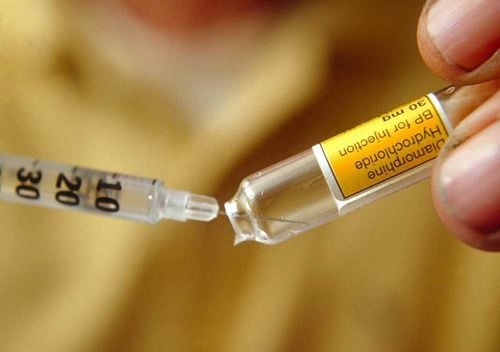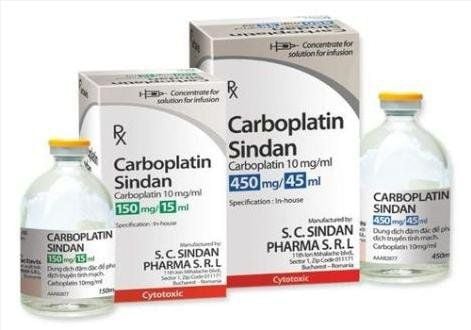This is an automatically translated article.
Carboplatin is a chemical used to treat cancer. Carboplatin is administered intravenously under the direction and close supervision of a physician. Like other cancer drugs, Carboplatin can cause some harmful reactions in users.
1. Uses of Carboplatin
Carboplatin what drug? Carboplatin is a platinum (platinum) heavy metal compound that inhibits the synthesis of RNA, DNA and proteins in cells. These compounds are important in cell division and growth. By stopping cells from dividing, the drug Carboplatin can stop cancer from growing.
Carboplatin is indicated in the following cancers: Ovarian cancer (stage Ic to IV, postoperative, recurrent, metastatic after treatment), lung cancer (including small cell lung cancer). , non-small cell), head and neck cancer, Wilms tumor, brain tumor, neuroblastoma, testicular cancer, bladder cancer, progressive and recurrent retinoblastoma in children...
2. How to take Carboplatin
Carboplatin is administered intravenously. Carboplatin dosing schedules and dosages are prescribed based on the size, kidney function, and type of cancer being treated. Carboplatin can be used as monotherapy or in combination with other drugs.
Even when used carefully and correctly by medical personnel, Carboplatin has the potential to cause burning sensation and pain when injected. This is explained by the risk of carboplatin leaking out of the vein at the injection site, leading to serious tissue damage. If the injection area becomes red, swollen, or painful at any time during or after Carboplatin injection, notify your doctor immediately.
Carboplatin may interact with a number of drugs including: some antibiotics, diuretics and blood thinners.
3. Possible Side Effects of Carboplatin
Patients can apply a number of different measures to control the side effects of Carboplatin, these measures will be guided and selected by the doctor for each specific patient. The following are some of the most common or important side effects of Carboplatin:
3.1. Decreased white blood cells, increased risk of infection White blood cells play a role in fighting infectious agents for the body. During treatment with Carboplatin, white blood cell counts may decrease and lead to an increased risk of infections. It is important that patients taking carboplatin tell their doctor or nurse immediately if they have any signs of an infection such as: fever over 38 degrees, sore throat, cold, trouble breathing, cough, painful urination, or other symptoms. slow-healing ulcers.
Some doctor's recommendations to limit infection while taking Carboplatin :
Wash your hands often ; Limit going to crowded places or contact with people showing signs of infection (people showing signs of cold, fever, cough or living with someone with these symptoms); Do not handle pet waste while being treated with Carboplatin; Keep skin wounds or scratches clean at all times; Bathing, personal hygiene, regular dental care; Do not remove corners or trim ingrown fingernails/toenails; Talk to your oncologist before having a dental procedure while taking Carboplatin; Consult your doctor before receiving any vaccine while taking Carboplatin. 3.2. Anemia due to reduced red blood cells Red blood cells are responsible for transporting oxygen in the blood to supply tissues in the body, so a low number of these cells will cause the organs in the body to be deprived of oxygen to function. symptoms such as fatigue or lack of energy. Patients should inform their doctor if they have symptoms of anemia such as shortness of breath, fatigue or chest pain... during Carboplatin treatment. In some cases, the red blood cell count is so low due to Carboplatin that a blood transfusion may be necessary.
3.3. Decreased Platelet Count Platelets are part of the blood clotting process, so a low platelet count leads to a higher risk of bleeding. If you are taking Carboplatin, tell your doctor if you have any unusual bruising or bleeding (bleeding from the nose or teeth, bloody urine, etc.). Platelet transfusion is necessary if the patient's platelet count is too low while taking Carboplatin.
Besides, patients should also avoid some activities that can cause bleeding during treatment with Carboplatin as follows:
Using razors; Playing contact sports that have the potential to cause injury or bleeding; Concomitant use of Carboplatin with Aspirin or non-steroidal anti-inflammatory drugs (NSAIDs); Use dental floss and toothpicks; Do not brush your teeth with a toothbrush that is too stiff. 3.4. Nausea, Vomiting During Carboplatin treatment, medications can be added to help control nausea and vomiting along with dietary changes, avoiding things that can worsen vomiting symptoms, such as food. eating too thick or too greasy/fat, spicy or acidic (lemon, tomato, orange).
3.5. Electrolyte changes Carboplatin drug may affect the normal index of electrolytes (sodium, potassium, magnesium, calcium...) in the body as shown by blood test results. If electrolyte levels are too low, your doctor may prescribe electrolytes for intravenous or oral supplementation. Do not take any supplements without consulting your doctor.
3.6. Hepatotoxicity The use of Carboplatin can cause liver toxicity, so the treating doctor can monitor it through regular liver function tests. Please inform your doctor if you have symptoms of liver toxicity while taking Capmatinib such as jaundice, yellow eyes, dark urine, right upper quadrant abdominal pain...
3.7. Kidney problems Carboplatin can affect kidney function, kidney function should be monitored during treatment. Try to drink at least 6-8 glasses of non-caffeinated liquids each day and call the doctor or nurse if the patient has not urinated for more than 12 hours.
3.8. Avoiding Live Vaccines Patients or any living relatives should avoid live vaccines or live attenuated vaccines during treatment with Carboplatin, including herpes zoster (Zostavax) for the prevention of shingles, polio, and shingles. , measles, flu vaccine (FluMist®), rotavirus vaccine, yellow fever...
3.9. Important but less common side effects of Carboplatin Peripheral neuropathy: this is a toxic condition affecting the nerves that causes numbness or tingling in the hands and/or feet, usually when wear socks or gloves. This condition may get worse with additional doses of Carboplatin . In some people, symptoms slowly go away after stopping the medication. Allergic reactions: In some cases, patients may have an allergic reaction to Carboplatin with signs including: rash, itching, hives, flushing and/or shortness of breath or difficulty breathing. .. need to notify medical staff immediately. Vision/Hearing Changes: In rare cases, Carboplatin can cause changes in hearing and vision.
4. How does carboplatin affect fertility?
Carboplatin exposure to the fetus can lead to birth defects, so patients should not become pregnant or father a child during cancer treatment with Carboplatin. Using effective birth control or birth control methods is essential. Even if the menstrual cycle stops or the patient believes that he or she is not producing sperm, conception is still possible. Note that the patient should not breast-feed while taking Carboplatin and for at least 1 week after the end of treatment. Carboplatin is a chemical used to treat cancer. Carboplatin is administered intravenously under the direction and close supervision of a physician.
Follow Vinmec International General Hospital website to get more health, nutrition and beauty information to protect the health of yourself and your loved ones in your family.
Please dial HOTLINE for more information or register for an appointment HERE. Download MyVinmec app to make appointments faster and to manage your bookings easily.
Reference source: oncolink.org












